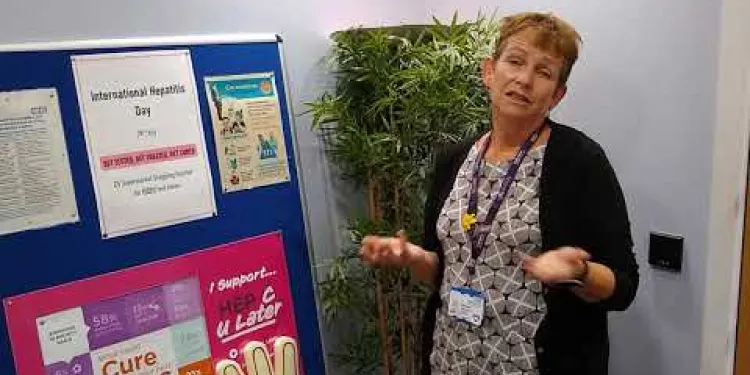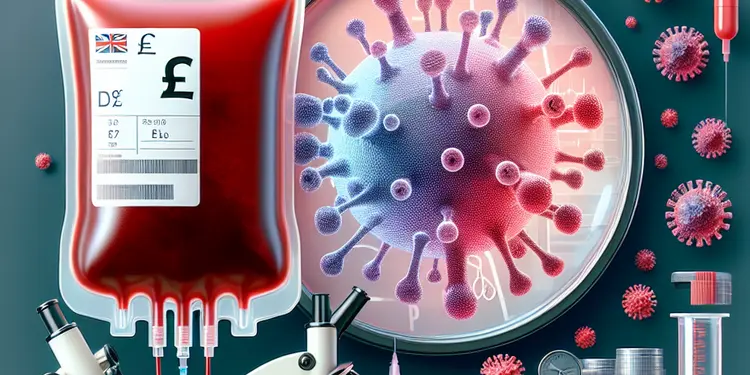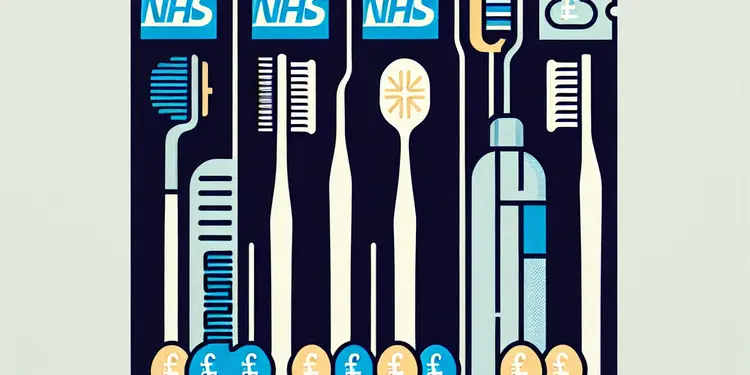Find Help
More Items From Ergsy search
-

What is the new treatment for hepatitis C like?
Relevance: 100%
-

Sue Doherty on hepatitis C awareness
Relevance: 63%
-

Is Hepatitis B a risk in blood transfusions?
Relevance: 61%
-

Liver disease | NHS
Relevance: 28%
-

New endometriosis pill approved on NHS in England
Relevance: 28%
-

What is the most common disease transmitted by blood transfusion?
Relevance: 28%
-
New Covid Variant Strains
Relevance: 28%
-

What other viruses are tested for in blood donations?
Relevance: 28%
-

Are new variants more transmissible?
Relevance: 28%
-

Should I be worried about new variants?
Relevance: 27%
-

Do all mutations in the virus lead to new variants?
Relevance: 27%
-
How often do new COVID-19 variants emerge?
Relevance: 26%
-

Breakthrough in Cancer Treatment Offers Hope for Prostate Cancer Patients
Relevance: 26%
-

Am I eligible to try the new sleep apnea chip?
Relevance: 26%
-

Are new COVID-19 variants more dangerous?
Relevance: 26%
-

Is Paillon treatment FDA approved?
Relevance: 26%
-

Will I qualify for the new state pension?
Relevance: 26%
-

Can children with cancer receive Paillon treatment?
Relevance: 26%
-

What treatments are available for Alzheimer's disease?
Relevance: 26%
-

Are new emerging pathogens a risk for blood safety?
Relevance: 26%
-

Are there new guidelines for property maintenance?
Relevance: 26%
-

What is the role of immunotherapy in prostate cancer treatment?
Relevance: 26%
-

What if there are no NHS dentists accepting new patients?
Relevance: 25%
-

Is Super Flu a new strain of virus?
Relevance: 25%
-

Is Paillon treatment used in any clinical trials?
Relevance: 25%
-

What new protections are included for tenants?
Relevance: 25%
-

The new death certification process in the UK
Relevance: 25%
-

What happens if I move to a new postcode?
Relevance: 25%
-

Can new variants cause reinfection?
Relevance: 25%
-

Are there waiting lists for NHS dental treatment?
Relevance: 25%
-

Are there clinical trials available for prostate cancer treatment?
Relevance: 24%
-

Can I transfer my TV license to a new address?
Relevance: 24%
-

What diseases can be spread by blood transfusions?
Relevance: 24%
-

Are chiropractic treatments painful?
Relevance: 24%
-
Do new variants affect COVID-19 testing?
Relevance: 24%
-

New Asylum Seekers Legislation Sparks Nationwide Debate
Relevance: 24%
-

Do balance transfer offers apply to new purchases?
Relevance: 24%
-

What treatments are available for eczema?
Relevance: 24%
-

Understanding the New Domestic Abuse Laws in the UK
Relevance: 24%
-

Are chiropractic treatments safe?
Relevance: 24%
What is the New Treatment for Hepatitis C Like?
Introduction to Hepatitis C Treatment
Hepatitis C, a viral infection that primarily targets the liver, has seen groundbreaking advancements in treatment methods over recent years. In the United Kingdom, the introduction of new antiviral medications has revolutionized the management of this disease, providing hope and a cure for many patients. This article explores the new treatment landscape for hepatitis C, focusing on the latest medical advancements.Direct-Acting Antivirals (DAAs)
The cornerstone of the new treatment for hepatitis C is the use of Direct-Acting Antivirals (DAAs). DAAs work by targeting specific steps in the hepatitis C virus (HCV) lifecycle, thereby preventing the virus from multiplying. Unlike older treatments which required prolonged therapy and had significant side effects, DAAs are more effective, have shorter treatment durations (usually 8-12 weeks), and come with a considerably reduced side effect profile.High Cure Rates
One of the most promising aspects of DAAs is their remarkably high cure rates. Clinical trials and real-world studies have demonstrated that DAAs can achieve a Sustained Virologic Response (SVR) – which is considered a cure – in more than 95% of treated patients. This success rate applies across various patient populations, including those with advanced liver disease, co-infections such as HIV, and previous treatment failures.Accessibility and the NHS
In the United Kingdom, the National Health Service (NHS) has made significant strides to ensure the accessibility of these life-saving treatments. Initiatives include nationwide screening programs, efforts to reduce the stigma associated with hepatitis C, and targeting high-risk populations such as intravenous drug users and prisoners. The NHS is also working to provide these treatments at no cost to the patient, which is a significant benefit in managing this public health issue.Personalized Treatment Plans
Another innovative aspect of the new hepatitis C treatments is the ability to customize therapy based on the patient's specific medical needs. Genotype testing of the virus allows healthcare professionals to select the most appropriate DAA regimen, optimizing the chances of a successful cure while minimizing potential side effects.Conclusion
The new treatments for hepatitis C represent a monumental shift in the management of this once-difficult-to-treat disease. With the advent of DAAs, patients in the UK can now look forward to a shorter, more effective, and less burdensome treatment journey. The NHS's efforts to make these treatments widely available underscore the public health commitment to eradicating hepatitis C and improving the lives of those affected.What is the New Treatment for Hepatitis C Like?
Introduction to Hepatitis C Treatment
Hepatitis C is a virus that attacks the liver. It is a serious illness. But now, there are new medicines that can help. In the UK, these new medicines have changed how we treat Hepatitis C. They bring hope and can even cure many people. Here, we will talk about these new treatments.Direct-Acting Antivirals (DAAs)
The new treatment for Hepatitis C uses special medicines called Direct-Acting Antivirals or DAAs. These medicines stop the Hepatitis C virus from growing. Unlike old treatments, DAAs work faster, usually in 8 to 12 weeks. They also have fewer bad effects on the body.High Cure Rates
The good news is that DAAs have a very high success rate. Tests show that DAAs can cure more than 95 out of 100 people who take them. This is true for many different people, even those with severe liver problems or other illnesses like HIV.Accessibility and the NHS
In the UK, the NHS is helping more people get these new treatments. They have programs to find and help people with Hepatitis C. They focus on people at high risk, like those who use drugs or are in prison. The NHS provides these treatments for free, which helps a lot.Personalized Treatment Plans
The new treatments can be tailored to each person. Doctors test the type of virus a person has. This helps them choose the best medicine for each patient, making the treatment work better with fewer side effects.Conclusion
The new treatments for Hepatitis C are a big change. With DAAs, people can now have a faster and easier treatment. The NHS is making sure everyone who needs it can get it. This helps to fight Hepatitis C and improve the lives of many people.Frequently Asked Questions
What is the new treatment for hepatitis C?
The new treatment for hepatitis C involves direct-acting antivirals (DAAs) which are highly effective and have shorter treatment durations.
How effective are the new hepatitis C treatments?
The new treatments are over 95% effective in curing hepatitis C.
What are DAAs?
DAAs, or direct-acting antivirals, are medications that directly target the hepatitis C virus to prevent it from multiplying.
How long does the new hepatitis C treatment take?
Treatment duration is typically between 8 and 12 weeks, shorter than older therapies.
Are there any side effects with the new hepatitis C treatments?
Side effects are generally mild and may include fatigue, headache, and nausea.
Do I need to be hospitalised for the treatment?
No, the new hepatitis C treatments are usually taken orally at home.
Is the new treatment available on the NHS?
Yes, the new hepatitis C treatments are available on the NHS.
Do I need regular monitoring during the treatment?
Yes, you will need regular blood tests to ensure that the treatment is working effectively.
Can everyone with hepatitis C use the new treatment?
Most people can use the new treatments, but suitability should be determined by a healthcare professional.
Is the new hepatitis C treatment suitable for all genotypes of the virus?
Yes, the new DAAs are effective against all major genotypes of hepatitis C.
Is there any need for dietary restrictions during treatment?
There are generally no specific dietary restrictions, but it’s always best to consult your healthcare provider.
Can the new treatment be used for patients with cirrhosis?
Yes, the new treatments can be effective for patients with both compensated and decompensated cirrhosis, but treatment must be monitored closely.
Are there any drug interactions I should be aware of?
Yes, always inform your healthcare provider about any medications you are taking to avoid potential interactions.
What happens if the new treatment doesn’t work?
In rare cases where the treatment doesn’t work, your healthcare provider will discuss alternative options with you.
Is there a chance of reinfection after successful treatment?
Yes, reinfection is possible if you are exposed to the hepatitis C virus again. It's important to avoid risky behaviours that could lead to reinfection.
What is the new medicine for hepatitis C?
Doctors have a new medicine to help people with hepatitis C. Hepatitis C is a sickness that hurts the liver. The new medicine can make people feel better and help their liver.
If you want to learn more, you can ask a doctor to explain. They can use simple words to help you understand. Also, you can use pictures to help you learn. Some people like listening to stories or watching videos to know more.
The new medicine for hepatitis C works really well. It is called direct-acting antivirals, or DAAs. You don't need to take it for a long time, and it helps people get better.
Do the new hepatitis C medicines work well?
The new treatments work very well. They can cure over 95 out of 100 people with hepatitis C.
What are DAAs?
DAAs are special medicines.
They help when someone is sick with a virus called Hepatitis C.
DAAs help people feel better.
If you want to know more, you can:
- Ask a doctor or nurse.
- Look at easy online guides with pictures.
- Use voice assistants to read about DAAs.
DAAs are medicines that help stop the hepatitis C virus from growing. They work by going straight to the virus.
How long does the new hepatitis C treatment take?
The new treatment for hepatitis C takes a short time. It can take about 8 to 12 weeks.
If you need help to read, you can:
- Ask someone to read it for you.
- Use a tool to read the words out loud.
- Look at pictures or videos about the treatment.
Treatment usually lasts 8 to 12 weeks. This is shorter than older treatments.
Do the new hepatitis C medicines cause any side effects?
Some people might feel different after taking the new hepatitis C medicines. Here are some things they might feel:
- Feeling tired
- Headache
- Feeling sick or dizzy
- Trouble sleeping
If you or someone you know is taking these medicines, it is important to talk to a doctor about how you feel. If anything feels wrong, they can help you.
Using a picture chart can help understand how you feel each day. Also, talk to a family member or friend if you feel unsure.
Side effects are usually not bad. They might make you tired, give you a headache, or make your tummy feel upset.
Do I need to go to the hospital to get better?
When you are sick, sometimes you need to go to the hospital. The doctor will help you feel better. If you are not sure, ask the doctor. They will tell you what is best for you.
You can use tools like a list. Write down questions before you see the doctor. You can also take a friend or family member with you to talk to the doctor together. They can help you remember what the doctor says.
No, the new medicine for hepatitis C is usually a pill you take at home.
Can you get the new treatment from the NHS?
We will help you check if you can get the new treatment from the NHS.
If you need help, ask someone you trust, like a family member or a friend.
You can also use tools that turn words into speech or make text bigger.
Yes, the new medicine to treat hepatitis C can be found on the NHS.
Do I need check-ups during treatment?
Yes, you will need to have blood tests often. This helps to make sure the treatment is working well.
Can all people with hepatitis C get the new medicine?
Some people with hepatitis C can get the new medicine.
But it might not be good for everyone. It's important to talk to your doctor.
Here are some ways to help:
- Ask a family member or friend to go to the doctor with you.
- Use simple words when talking about your health.
- Write down what the doctor says to remember later.
Most people can use the new treatments, but a doctor or nurse should check if it's right for you.
Can the new hepatitis C medicine help everyone with the virus?
Yes, the new medicine works well for all types of hepatitis C.
Do I need to change what I eat during my treatment?
There are usually no special rules about what you can eat. But it's a good idea to ask your doctor for advice.
Can people with liver damage use the new treatment?
Some people have a very sick liver. Doctors call this cirrhosis.
We want to know if these people can take the new medicine.
Here are some tips to help understand:
- Ask a doctor for advice.
- Use pictures to help explain.
- Listen to information read aloud.
Yes, the new treatments can help people with liver problems. This works for both those with mild and severe liver issues. But doctors need to watch the treatment carefully.
Do any medicines not work well together?
When you take medicine, some medicines should not be mixed.
It is important to make sure that your medicines are safe to use together.
Here are some things you can do:
- Ask your doctor or pharmacist if your medicines are safe together.
- Use a medication checker app to see if your medicines are okay together.
- Always tell your doctor about all the medicines and vitamins you are taking.
Be careful and stay safe!
Yes, always tell your doctor what medicines you are taking. This helps to make sure the medicines work well together and don’t cause any problems.
What if the new treatment doesn't help?
Sometimes, a new treatment might not make you feel better. If this happens, you can:
- Talk to your doctor. They can help you find another treatment.
- Ask questions. It's okay to ask why it's not working.
- Use a notebook. Write down how you feel and what changes happened.
- Talk to someone you trust. They can give you support.
Sometimes, the treatment might not work. If this happens, the doctor or nurse will talk to you about other things you can try.
Can I get sick again after I get better?
Yes, you can catch hepatitis C again if you are around the virus. It's important to stay away from things that can make you sick again.
Useful Links
This website offers general information and is not a substitute for professional advice.
Always seek guidance from qualified professionals.
If you have any medical concerns or need urgent help, contact a healthcare professional or emergency services immediately.
Some of this content was generated with AI assistance. We’ve done our best to keep it accurate, helpful, and human-friendly.
- Ergsy carfully checks the information in the videos we provide here.
- Videos shown by Youtube after a video has completed, have NOT been reviewed by ERGSY.
- To view, click the arrow in centre of video.
- Most of the videos you find here will have subtitles and/or closed captions available.
- You may need to turn these on, and choose your preferred language.
- Go to the video you'd like to watch.
- If closed captions (CC) are available, settings will be visible on the bottom right of the video player.
- To turn on Captions, click settings .
- To turn off Captions, click settings again.
More Items From Ergsy search
-

What is the new treatment for hepatitis C like?
Relevance: 100%
-

Sue Doherty on hepatitis C awareness
Relevance: 63%
-

Is Hepatitis B a risk in blood transfusions?
Relevance: 61%
-

Liver disease | NHS
Relevance: 28%
-

New endometriosis pill approved on NHS in England
Relevance: 28%
-

What is the most common disease transmitted by blood transfusion?
Relevance: 28%
-
New Covid Variant Strains
Relevance: 28%
-

What other viruses are tested for in blood donations?
Relevance: 28%
-

Are new variants more transmissible?
Relevance: 28%
-

Should I be worried about new variants?
Relevance: 27%
-

Do all mutations in the virus lead to new variants?
Relevance: 27%
-
How often do new COVID-19 variants emerge?
Relevance: 26%
-

Breakthrough in Cancer Treatment Offers Hope for Prostate Cancer Patients
Relevance: 26%
-

Am I eligible to try the new sleep apnea chip?
Relevance: 26%
-

Are new COVID-19 variants more dangerous?
Relevance: 26%
-

Is Paillon treatment FDA approved?
Relevance: 26%
-

Will I qualify for the new state pension?
Relevance: 26%
-

Can children with cancer receive Paillon treatment?
Relevance: 26%
-

What treatments are available for Alzheimer's disease?
Relevance: 26%
-

Are new emerging pathogens a risk for blood safety?
Relevance: 26%
-

Are there new guidelines for property maintenance?
Relevance: 26%
-

What is the role of immunotherapy in prostate cancer treatment?
Relevance: 26%
-

What if there are no NHS dentists accepting new patients?
Relevance: 25%
-

Is Super Flu a new strain of virus?
Relevance: 25%
-

Is Paillon treatment used in any clinical trials?
Relevance: 25%
-

What new protections are included for tenants?
Relevance: 25%
-

The new death certification process in the UK
Relevance: 25%
-

What happens if I move to a new postcode?
Relevance: 25%
-

Can new variants cause reinfection?
Relevance: 25%
-

Are there waiting lists for NHS dental treatment?
Relevance: 25%
-

Are there clinical trials available for prostate cancer treatment?
Relevance: 24%
-

Can I transfer my TV license to a new address?
Relevance: 24%
-

What diseases can be spread by blood transfusions?
Relevance: 24%
-

Are chiropractic treatments painful?
Relevance: 24%
-
Do new variants affect COVID-19 testing?
Relevance: 24%
-

New Asylum Seekers Legislation Sparks Nationwide Debate
Relevance: 24%
-

Do balance transfer offers apply to new purchases?
Relevance: 24%
-

What treatments are available for eczema?
Relevance: 24%
-

Understanding the New Domestic Abuse Laws in the UK
Relevance: 24%
-

Are chiropractic treatments safe?
Relevance: 24%


